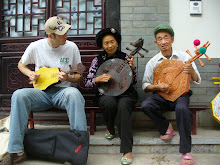In early June, 2008, I sat in a tiny straw hut in northern Beijing and listened to Wa man named Sai close his eyes, tilt his head back, and sing a heartrending ode to Chairman Mao. There were three identical huts in Sai’s “village”; each was fitted with two benches, a cooking pot, and a color television. Together, they comprised the Wa division of the Minzuyuan, or Ethnic Culture Park, an Elysium of ethnic harmony tucked neatly in between the Bird’s Nest and the Ming Ruins. In keeping with its goal of "promoting unity of all Chinese nationalities," the park’s Tujia can freely dine on Thai, and its North Korean Autonomous Prefecture is only a shuttle ride away from Qinghai-Tibet. The prettiest voice in his hometown, Sai had been plucked from Gengma, Yunnan by park cadres that spring and handed an unrenewable two-year contract. “How do you like it here, Sai?” I asked him. He shrugged. “Beats what I’d be doing in Gengma.”
The Ethnic Culture Park is the pinnacle of China kitsch. It screams for problematization, but its underlying problems are so deep-rooted that they seem impervious to change. We can blame it on Mao’s heavy-handed classification of China’s minorities in the 50’s, the CCP's almost Orientalist, exoticizing bent, or the plain absurdity of building straw huts in Beijing. But in the end, the biggest problem is an unshakeable feeling of condescension; the questionable morality involved in turning a minority culture into a spectacle. It’s a feeling that I’ve thought about at length, but until recently, never felt myself.
Early last month, I sat in a small restaurant in Chengdu with two fellow Fulbrighters, David and Charles, enjoying a Sichuanese breakfast of spicy noodles and mangosteens.
"Never, ever play a laowai gig," said David, using the Chinese word for foreigner. "It leaves you feeling... dirty."
“What’s a laowai gig?”
The biggest difference between my American and Chinese selves is that the latter doesn’t balk at the prospect of humiliation. So when Charles mentioned in passing that he promised an agent he'd play a laowai gig that night, my Chinese self immediately signed on. So did David’s. A couple of phone calls later, the agent swung by his apartment for a briefing. “Prepare four songs,” he told us, “and wear black leather shoes. You must absolutely not forget your shoes.”
The agent picked us up in a company van at four, and although we arrived at around five-thirty, the trip felt endless. Urban Chengdu slowly fanned out into typical Chinese exurbs -- meadows of dust and rubble, eerily distant apartment blocks. About a half-hour into the void, we turned a right, passed some old Maoist slogans, and pulled up to a banquet hall that might have dropped right out of suburban Connecticut.
The venue was an early spring festival reception for the financial giants behind a new gated community in the area. The average attendees were overweight Chinese men sporting flat-top haircuts and short-sleeve office shirts. Their wives chatted with the other wives about daytime television; their children picked at hot dogs and french fries from the buffet. The PA played L-O-V-E by Nat King Cole on repeat. A line of beautiful Chinese girls stood at the door wearing white gowns and heavy makeup. Behind them, another foreigner stood dressed as a chef. His name was Eric. He'd never cooked a meal in his life.
The next half-hour was somewhat of a blur. The agent led us into a back room and threw us ill-fitting black suits and bow-ties. Once we were dressed, he pushed us onto a glittery silver stage in the foyer. We sang though an indie round and a bluegrass cover, drawing curious glances from a few kids around the stage. Before we could break into our third song -- a jazz standard for guitar and clarinet -- the agent tapped me on the shoulder and motioned for us to step off. We nabbed a bottle of Great Wall wine from the buffet, opened it with a plastic fork, and finished it backstage with the door girls.
London, 1880
Chengdu, 2010
***
For as long as I’ve been alive, fear has been a deep-rooted aspect of the American psyche. The rise of China isn’t helping. Stoked by sensational media coverage, we live under the constant threat of an increasingly cocksure PLA, unfair trade policy, environmental catastrophe; the prospect of a G1 world with an authoritarian one-party system on top. But my greatest fear is a less-discussed potential consequence of these shifting dynamics. The subsumption and non-consensual appropriation of my identity as an American. The construction of a “Laowai Village” in that Ethnic Park -- a little, white-picket piece of New Jersey somewhere in between Sai's straw huts and Little Xinjiang.



